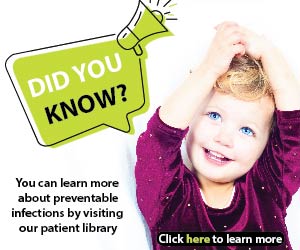An ounce of prevention: Counselling your travelling patients
-320x247.jpg)
Are your patients savvy travellers?
For many Canadians, a trip to a faraway destination is a thrill of a lifetime. Many are not thinking of the diseases they may be exposed to in their travels – from polio to diarrhea – or the protective measures they could take to avoid having illness interrupt their holiday.
Increasing international travel has meant greater risks of travel-related illnesses. When patients are planning a trip, physicians are advised to perform a risk assessment to identify individual traveller-, itinerary-, and destination-specific risks.1
In particular, patients who are less seasoned travellers, and immigrant travellers visiting friends and relatives, may benefit from consultation with their physician or a referral to a travel clinic at least 6 weeks in advance.1
As many as 98% of your travelling patients will make a food or drink error within the first few days of arriving at their foreign destination.2 In many cases, this involves consuming food or water contaminated with the enterotoxigenic E. coli (ETEC).The bacteria, which often causes diarrhea in travellers can also be transmitted from person to person (including restaurant food handlers) due to inadequate hygiene practices.3
The Centers for Disease Control (CDC) estimates that 30% to 70% of travellers to a tropical region will have at least one episode of diarrhea,3 with potentially serious consequences for the very young, elderly, and individuals with chronic health conditions.4
For people travelling to Central and South America, the Caribbean, South Asia and Africa, preventive measures such as bismuth subsalicylate or the oral cholera and ETEC-diarrhea vaccine, may help reduce the risk of diarrhea during travel.5
Other vaccine considerations – especially for travel to tropical areas such as the Caribbean – include hepatitis A and typhoid, transmitted by contaminated food and water. And adventuresome individuals who may get a tattoo to commemorate their holiday, or be exploring caves or places inhabited by bats, might consider vaccination to protect against hepatitis B, rabies, and Yellow Fever.6
Measles, a potentially serious and highly contagious disease, is a growing concern both at home and abroad. The World Health Organization (WHO) has reported outbreaks in numerous travel destinations including Brazil and India, and smaller flare-ups in France, Israel and Italy. The CDC advises international travellers to be fully vaccinated against measles at least two weeks before departure.5
Vaccine-hesitant patients or those who would vaccinate their children but not themselves might be swayed if they were more aware of the risks. For instance, an unvaccinated person can get measles by breathing the air in a room that was occupied hours before by a person with measles.7
Regardless of destination, travellers are advised to ensure that in addition to measles-mumps-rubella (MMR), they are up to date with other routine immunizations such as diphtheria-tetanus-pertussis (DPT), varicella, polio, and the yearly flu shot.6
In general, Health Canada encourages healthcare professionals to take a vaccine-recipient centred approach, and “make the most of each opportunity to encourage questions, to address misinformation, and to provide valid and appropriate messages and resources…”7
Red flags for your travelling patients1
- Pregnancy, age, visiting family, last minute traveller
- Missionary or medical work,
- Chronic illness/ immunocompromised,
- High-risk destination
These red flags may warrant a referral to a travel clinic or travel medicine specialist.
Web Resources
- Vaccines411 Travel Resources page
https://vaccines411.ca/en/vaccine-info/Vaccines-Resources/travel-resources - Risk assessment – Travel medicine triage algorithm
https://www.ncbi.nlm.nih.gov/pmc/articles/PMC4264804/figure/f1-0601091/?report=objectonly - Resources – Health Canada immunization facts
https://www.canada.ca/en/public-health/services/publications/healthy-living/canadian-immunization-guide-part-1-key-immunization-information/page-5-communicating-effectively-immunization.html#p1c4a3
Brought to you by Vaccines411.ca – know where to go for your vaccinations.
This information should not be used as a substitute for the medical care and advice of your doctor. There may be variations in treatment that your physician may recommend based on individual facts and circumstances.
Sources
Note: the hyperlinks that direct to other sites are not continuously updated. It is possible that some links become untraceable over time. Thank you.
- Travel medicine
https://www.ncbi.nlm.nih.gov/pmc/articles/PMC4264804/#!po=21.4286 - Factsheet: travel vaccines – enterically borne
http://www.bcpeds.ca/uploadfiles/documents/npfv/Travel_Vaccines.pdf - travellers' Diarrhea
https://wwwnc.cdc.gov/travel/yellowbook/2020/preparing-international-travellers/travellers-diarrhea - Traveller's Diarrhea and Cholera Vaccine
https://www.healthlinkbc.ca/healthlinkbc-files/travellers-diarrhea-cholera-vaccine - Travellers' diarrhea
https://www.canada.ca/en/public-health/services/diseases/diarrhea.html - Are Immunizations Needed for Caribbean Travel?
https://www.tripsavvy.com/are-immunizations-needed-for-caribbean-travel-1487683 - Disease Watch: What Global travellers Should Know In Summer 2019
https://www.npr.org/sections/goatsandsoda/2019/06/28/736622553/disease-watch-what-global-travellers-should-know-in-summer-2019 - Communicating Effectively about Immunization
https://www.canada.ca/en/public-health/services/publications/healthy-living/canadian-immunization-guide-part-1-key-immunization-information/page-5-communicating-effectively-immunization.html



